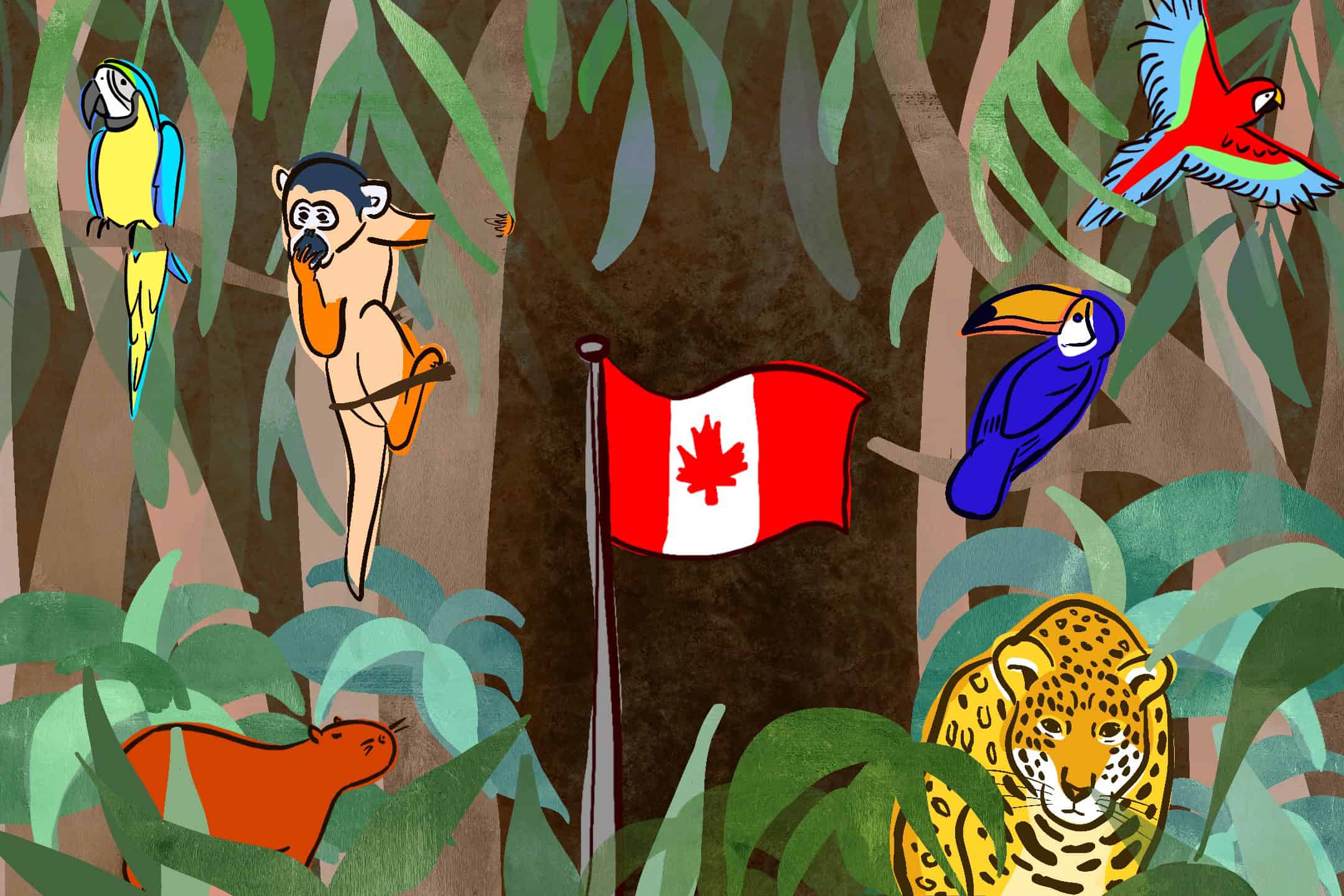In the Amazon rainforest, the lands, cultures, and Indigenous tribes’ ways of life are directly threatened by the destruction.
While the Amazon has faced long-scale devastation, under former Brazil president Jair Bolsonaro’s leadership, deforestation reached a 15-year high in 2021. However, the responsibility for this large-scale decimation is not limited to Brazil — Canada is also complicit in exploiting Amazonian resources.
Deforestation in the Amazon will have long-term, irreversible consequences for our climate, but the crisis extends beyond environmental impact. I believe deforestation is a serious violation of human rights, and Canada’s haunting presence in the Amazon directly threatens Indigenous peoples and their survival which depends on the land.
What does the destruction of the Amazon Rainforest mean?
Environmentally, the rapid deforestation of the Amazon destroys the most biodiverse forests in the world, disrupting ecosystems, weakening climate resilience, and depleting vital resources. The Amazon acts as a carbon sink — absorbing more carbon than it releases into the atmosphere — which helps to mitigate the effects of climate change. Currently, the rainforest absorbs 150–200 billion tons of carbon, so its deforestation would further exacerbate global warming and accelerate climate crises.
However, the destruction of the Amazon signifies much more than just ecological damage; it threatens the very existence of Indigenous communities that have thrived there for approximately 32,000–39,000 years. The region is home to 47 million people, including around 2.2 million Indigenous individuals who speak approximately 300 different languages.
Destructing this region could soon leave people without homes or communities, ultimately erasing entire cultures. Some of the communities in the region include the Tikuna, Uru-Eu-Wau-Wau (Jupau), Awa, Korubo, Kawahiva, Yanomami, Akuntsu, and Piripikura tribes, and many others.
These communities not only depend on the Amazon but are also the reason one of the most vital resources on Earth remains standing today. The tribes’ traditional practices promote sustainable forest management, and much of their beliefs are deeply rooted in protecting the environment, emphasizing the connection between people and the land.
By continuing to ignore the plight of Indigenous communities and the vital ecosystems they protect, we contribute to endangering their lives and risk losing a future of healing for the Earth. And while the Amazon’s destruction continues to imperil these communities, I believe Canada’s role warrants deeper scrutiny.
The Canadian factor
Canadian and Brazilian relations date back to 1866, and remain strong to this day. Amid the rainforest’s destruction, the Canadian government has launched initiatives aimed at supporting Indigenous peoples during the climate crisis.
The first initiative is the Enhancing Indigenous Peoples’ Resilience to Climate Change in Colombia program, funded through a $9.5 million partnership with the World Food Programme. This funding, allocated for the 2023–2024 to 2027–2028 fiscal years, supports projects in local Indigenous and rural communities.
While I believe this initiative is a commendable effort to support the livelihood of the Amazon’s Indigenous tribes, Canada still contributes to the rainforest’s rapid deforestation. Canada also has a longstanding history of cultural genocide against Indigenous communities within its own borders, and its mistreatment now extends to Indigenous people in other parts of the world. According to Amazon Watch — a non-profit organization which advocates for the rainforest and Indigenous peoples of the Amazon basin — Canada is a “key culprit in Amazon destruction.”
Over the past 30 years, Canada has built significant mining investments in Latin America. According to a 2023 Amazon Watch report titled Unmasking Canada: Rights Violations across Latin America campaign, 16 Canadian companies, supported by Canadian banks, are involved in 27 mining and eight oil extraction projects across Brazil, Colombia, Ecuador, and Peru. 10 of these projects directly jeopardized the livelihoods of at least 16 Indigenous ethnic groups in the Amazon region.
Additionally, one of the biggest trade agreements that Canada is involved in is MERCOSUR — Mercado Común del Sur (Southern Common Market) — a 1991 agreement established between the four founding countries: Argentina, Brazil, Paraguay, and Uruguay. Its purpose is to generate business and investment opportunities by integrating national economies into the international market.
However, MERCOSUR also prioritizes economic growth through expanding agricultural business and trade, which contributes to the widespread deforestation of the Amazon. As of 2021, Canada was negotiating additional MERCOSUR agreements during Bolsonaro’s presidency, furthering their complicity in the deforestation of the rainforest.
While Canada is aiding the protection of the Amazon’s Indigenous communities amid the deforestation crisis, this does not negate the fact that Canada simultaneously continues to play a role in their destruction through its involvement in industrial mining in the Amazon.
I urge you all to consider not only the impact this will have on our lives outside of the Amazon — as all human survival depends on global environmental wellbeing — but also the millions of Indigenous peoples whose very source of life is being obliterated. This is a profound moral responsibility that demands urgent global action, particularly from Canada which prides itself on being an environmental leader through measures like Prime Minister Trudeau’s carbon tax and the Paris Agreement.
Canada must hold itself accountable to these principles and stop supporting practices that contribute to environmental destruction, ensuring that its actions align with the values it projects.
Vesa Lunji is a second-year student at University College studying health & disease and cell & molecular biology. She is an International Affairs columnist for The Varsity’s Opinion section.



No comments to display.